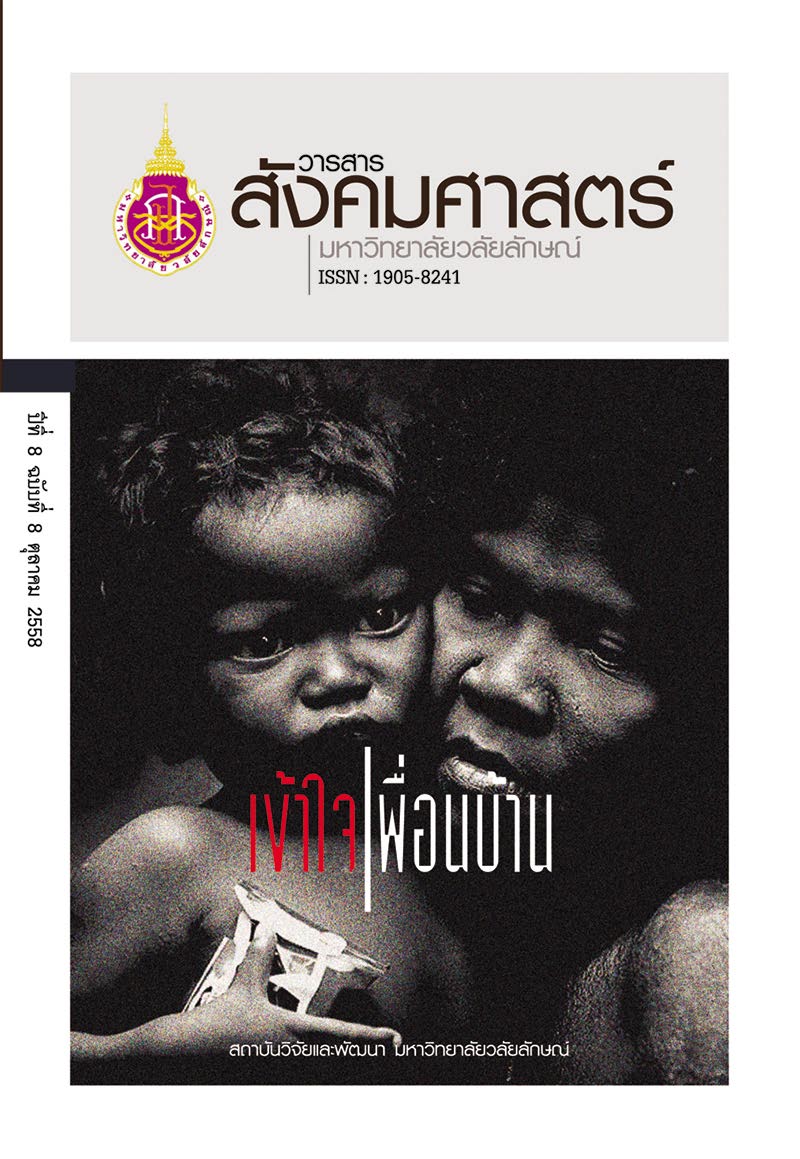The Socialist State and the Making of the Feudal Heritage into a Product: A Case Study of the Silverware Craftsmen (in Thai)
Main Article Content
Abstract
This article is based on a study of the conditions and factors of revival and reinventing the history of Luang Prabang, which are used to respond to tourism. Silverware craftsman lifestyle previously perceived as only the continuation of the past has interestingly become a cultural product in the tourist industry that highlights nostalgia, the yearning for the past. The study focuses on resurrection and reproduction of the past of silverware craftsmen in the context of tourism in the New Economic Mechanism Era in Luang Prabang, Laos. This research employs the concept of “Invention of traditions” as a theoretical framework to clarify the phenomenon. This particular concept will elucidate the silverware craftsmen with a vital cultural identity that reflects an environment of cultural tourism which appeals to nostalgia of the earlier period before the socialist state. This study is a qualitative research. Data were gathered from in-depth interviews and participatory observation. Data were also derived from both Thai and Lao documents.
The study finds that the silverware craftsmen take an outstanding position of a cultural product in tourism in Luang Prabang in terms of being part of the former capital before the revolution and ultimately was destroyed along with the royal institution in 1975. However, after the New Economic Mechanism was adopted in 1986, the socialist 130 state has accepted culture from the former regime. Silverware craftsmen were brought back again as an invented cultural product in order to promote tourism in Luang Prabang. Moreover, being part of the living culture has resulted in Luang Prabang becoming a world heritage city which has been recognized as “A City of Living Culture”.
รัฐสังคมนิยมกับการทำให้มรดกศักดินา กลายเป็นสินค้า: กรณีศึกษาช่างเงิน เมืองหลวงพระบาง
บทความนี้มีวัตถุประสงค์เพื่อศึกษา เงื่อนไข และปัจจัยของการรื้อฟื้น/ประดิษฐ์สร้าง อดีตของหลวงพระบางในบริบทที่ตอบสนองต่อ อุตสาหกรรมการท่องเที่ยว โดยใช้กรณีศึกษา จากช่างเงินแห่งเมืองหลวงพระบางในฐานะของ การเป็นวิถีชีวิตที่เป็นตัวแทนถึงความต่อเนื่อง ของอดีตที่กลายเป็นวัฒนธรรมเพื่อการค้าใน บริบทการท่องเที่ยวเพื่อการถวิลหาอดีต และ เพื่อศึกษากระบวนการรื้อฟื้น/ประดิษฐ์สร้างอดีต ของช่างเงินหลวงพระบาง ให้ตอบสนองกับ บริบทการท่องเที่ยวในยุคจินตนาการใหม่บนพื้นที่ เมืองหลวงพระบางสาธารณรัฐประชาธิปไตย ประชาชนลาว โดยใช้แนวคิดเรื่องการประดิษฐ์ ประเพณีมาเป็นกรอบ และประยุกต์แนวคิดดัง กล่าวศึกษาช่างเงินในฐานะการเป็นตัวตนทาง วัฒนธรรมหนึ่งที่ยังมีชีวิต อันเป็นองค์ประกอบของบรรยากาศการ ท่องเที่ยวเชิงวัฒนธรรมที่ให้อารมณ์โหยหาอดีตให้แก่อุตสาหกรรม การท่องเที่ยวเมืองหลวงพระบาง การศึกษาครั้งนี้ใช้การวิจัยเชิงคุณภาพ รวบรวมข้อมูลจากการสัมภาษณ์เชิงลึก การสังเกตอย่างมีส่วนร่วม นอกจากนี้ยังใช้ข้อมูลจากเอกสารทั้งภาษาไทยและภาษาลาว
ผลการศึกษามีข้อค้นพบสำคัญ คือ ช่างเงินหลวงพระบางมี ฐานะที่กลายเป็นสินค้าทางวัฒนธรรมอันโดดเด่นให้กับอุตสาหกรรม การท่องเที่ยวเมืองหลวงพระบาง อันมีเงื่อนไขสำคัญมาจากการเป็น ส่วนหนึ่งของความเป็นอดีตราชธานีก่อนการเปลี่ยนแปลงการปกครอง ในขณะที่อารมณ์ความถวิลหาอดีตนั้น มีเงื่อนไขมาจากการเป็น วัฒนธรรมหนึ่งที่เคยถูกทำลายไปพร้อมกับสถาบันพระมหากษัตริย์ เมื่อครั้งลาวเปลี่ยนแปลงการปกครองเป็นสังคมนิยมในปี ค.ศ. 1975 ทว่าภายหลังการเปิดประเทศภายใต้นโยบายจินตนาการใหม่ตั้งแต่ปี ค.ศ. 1986 ได้เกิดปัจจัยผลักดันสำคัญอันทำให้รัฐสังคมนิยมต้องให้ การยอมรับตัวตนและอิทธิพลทางวัฒนธรรมของระบอบกษัตริย์ที่มีต่อ สังคมและเศรษฐกิจลาว ดังนั้นการที่ลาวเปิดประเทศรับระบบทุนนิยม จึงกลายเป็นปัจจัยสำคัญที่ทำให้ช่างเงินหลวงพระบางถูกรื้อฟื้นกลับ ขึ้นอีกครั้งภายใต้กระบวนการของการเป็นสิ่งที่ถูกประดิษฐ์สร้างให้เป็น ตัวตนทางวัฒนธรรมชาติเพื่อการท่องเที่ยวเมืองมรดกโลก ในฐานะ ส่วนหนึ่งของบรรยากาศวัฒนธรรมที่ยังมีชีวิต และโดยเฉพาะการเป็น ส่วนหนึ่งของเมืองมรดกโลกที่โดดเด่นด้านวัฒนธรรม
Article Details
Copyright: CC BY-NC-ND 4.0


